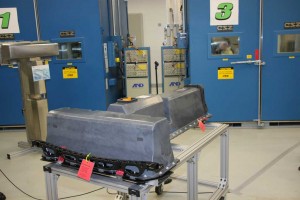
Driving down the cost of lithium-ion batteries -- like the Chevy Volt pack shown here -- is a goal of an investment by GM's new venture capital subsidiary.
General Motors’ new venture capital fund and Tokyo Itochu Technology Ventures have teamed up to invest in Sakti3, an Ann Arbor, Michigan-based maker of lithium-ion battery cells.
Jon Lauckner, president of GM Ventures, LLC, said while the total amount of money involved was a relatively modest $4.2 million, it represented a strategic investment in new technology to support its core automotive business.
“Our objective is to identify start-up companies that offer the best future technology for our vehicles, including next generation propulsion systems. In this case, our investment in Sakti3 gives us access to an innovative battery technology that has the potential to be a mainstream solution for electrically-driven cars and trucks of the future,” he added.
With its Chevrolet Volt extended-range electric vehicle, or E-REV, slated for launch late this year, GM has been making a number of investments and lining up partnerships with a variety of players in the expanding world of electric propulsion. That includes a tie-up with South Korea’s LG Chem, which is providing the batteries for Volt. GM also announced, earlier this year, plans to produce its own electric motors.
Ann Marie Sastry, Sakti3 founder and chief executive officer, says the investment by GM and Itochu Technology Ventures will speed her company’s commercialization efforts.
“Our product planning in the automotive and portables sectors will be accelerated by working with these two preeminent firms. The General Motors agreement partners us with a company that is clearly a global leader in vehicle electrification,” she said, while also noting that, “Itochu Technology Ventures has a strong focus on energy technologies, and on growth markets in Asia.”
The new deal was praised by Michigan’s powerful Sen. Carl Levin, who said, “Sakti3’s solid-state advanced lithium ion battery technology offers tremendous potential for powering the next generation of electric drive vehicles in the U.S. and around the world.”
While Michigan may have a reputation for being anchored in the old world of metal-bending, the state is making a growing push into advanced green technologies. Sakti3, for one, emerged from efforts at the University of Michigan.
“Sakti3 represents a new wave of companies that we are spinning out of the University of Michigan, and Dr. Sastry’s leadership has led to rapid progress in a short time,” said Ken Nisbet, U-M’s Director, Office of Technology Transfer.
The 2007 spin-off has been focusing on developing novel manufacturing processes to improve the performance and reliability of lithium-based batteries, while also driving down cost. The technology needs to come down from an average of around $1,000 a kilowatt/hour to something closer to $200 to become competitive with conventional internal combustion technology, according to a study released earlier this year by Boston Consulting.
The savings would be significant, driving the cost of producing a 16 kWh battery – the size used by Volt – down from around $16,000 to just $3,200.
